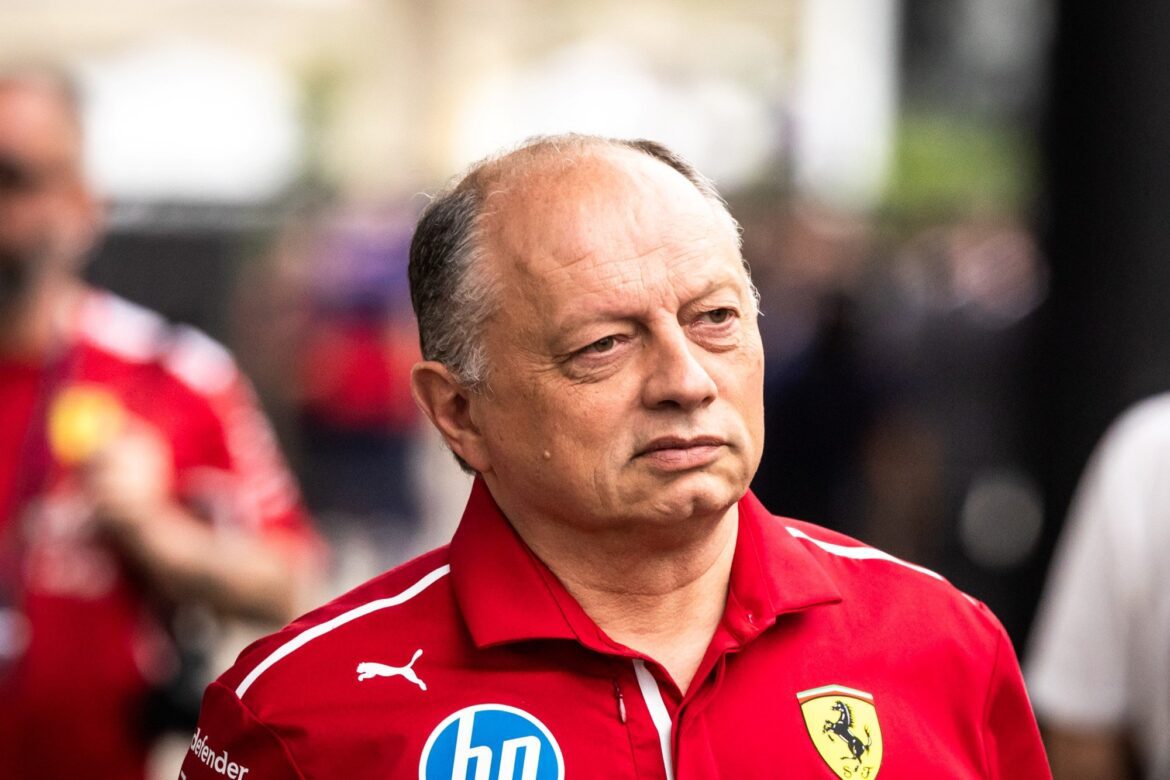Ferrari’s Performance in Formula 1: Analyzing the 2025 Season Challenges and Opportunities
As the 2025 Formula 1 season unfolds, Ferrari is making strides in performance, yet challenges remain. The team’s principal, Fred Vasseur, has acknowledged the improvements in the squad’s overall performance but has also pointed out a critical issue that needs addressing: the disparity between qualifying pace and race pace. This gap has significant implications for race outcomes and overall championship standings.
During the Saudi Arabian Grand Prix, Charles Leclerc achieved a notable milestone for Ferrari by securing the team’s first podium of the season with a third-place finish. Despite this achievement, Leclerc found himself unable to contend for the victory, finishing 8.1 seconds behind the race winner, Oscar Piastri. This performance highlights a recurring theme in the current season—while Ferrari shows promise and potential, there are still significant hurdles to overcome to compete effectively against rivals like Piastri and Max Verstappen.
Vasseur has emphasized that while Leclerc exhibited a commendable race pace, the team must urgently enhance their performance during qualifying sessions. The contrast between the two types of sessions is where Ferrari has struggled the most. “The critical issue for us is the difference between our qualifying rhythm and our race rhythm,” Vasseur stated, underscoring the importance of consistency across different phases of a race weekend.
In analyzing Leclerc’s performance in Jeddah, Vasseur noted that the Monegasque driver was faster than both Piastri and Verstappen during the latter stages of the race. “I believe we were quicker than Piastri and Verstappen in the last 35 or 40 laps, but we faced significant challenges during qualifying, and that’s where we need to concentrate our efforts,” he explained. This statement illustrates a key aspect of modern Formula 1 racing: the ability to maximize performance in qualifying can greatly affect race outcomes, particularly in a sport where track position is paramount.
One of the pressing concerns for Ferrari is the impact of starting positions on race results. Vasseur pointed out that starting from a lower grid position, such as fourth, places drivers in a challenging situation. “When you start from fourth, you are already in dirty air, which costs you several seconds in the first five laps. Even if you have a strong race, the best you can hope for is third place,” he remarked. This insight reflects the complexities of race strategy in Formula 1, where every fraction of a second counts, and starting position can dictate the flow of the race.
Despite these challenges, Vasseur remains optimistic about the team’s trajectory. He views the performance in Jeddah as a fundamentally positive development. “It was a productive weekend in Jeddah, and we’ve made progress. Our race pace was very strong, and the potential is there for us to improve further,” he concluded. This optimism is essential in a sport where teams must constantly adapt and evolve to stay competitive.
As Ferrari continues to navigate the 2025 season, the emphasis on bridging the gap between qualifying and race performance will be critical. The team’s engineers and strategists will need to analyze data from each session meticulously, identifying areas where they can enhance their setup and tire strategy to optimize both qualifying and race performance.
The importance of data analysis cannot be overstated in Formula 1. Teams utilize advanced telemetry systems to gather real-time information about tire wear, fuel consumption, and aerodynamic efficiency. By dissecting this data, Ferrari can gain insights into how to fine-tune their car’s setup for qualifying to ensure that drivers can extract maximum performance from the car when it matters most.
Moreover, the development of the car throughout the season will play a crucial role in improving performance. As the season progresses, teams are allowed to make adjustments and upgrades to their cars, and Ferrari must leverage this opportunity to enhance their competitive edge. Continuous development will be vital to closing the gap with rivals who are currently ahead in terms of performance.
In addition to technical improvements, team dynamics and driver performance are equally important. Leclerc’s ability to communicate effectively with his engineers and provide feedback on the car’s performance will be vital for achieving the necessary improvements. A strong driver-engineer relationship can lead to better decision-making during races and qualifying, ultimately contributing to more favorable results.
The psychological aspect of racing also plays a significant role in performance. Drivers must maintain focus and confidence, especially when facing challenges. Leclerc, in particular, will need to harness any momentum gained from his podium finish in Saudi Arabia to propel himself forward in subsequent races. A positive mindset can influence performance on the track, particularly in high-pressure situations.
As Ferrari looks ahead to the upcoming races, the team’s ability to adapt and innovate will be tested. Balancing the demands of qualifying with the unpredictability of race day requires a multifaceted approach. By addressing the disparities in pace and implementing effective strategies, Ferrari can position itself as a formidable competitor in the 2025 Formula 1 season.
In conclusion, while the road ahead may be fraught with challenges, the potential for growth and improvement exists within the Ferrari team. With a focus on bridging the gap between qualifying and race performance, the right technical developments, and strong driver communication, Ferrari can aim for greater success in the races to come. The upcoming events will serve as a litmus test for the team’s strategies and their ability to capitalize on the lessons learned thus far in the season. As the excitement of Formula 1 continues to unfold, fans will be eagerly watching to see how Ferrari navigates these critical challenges and strives for excellence on the track.
